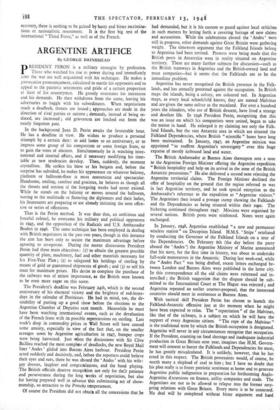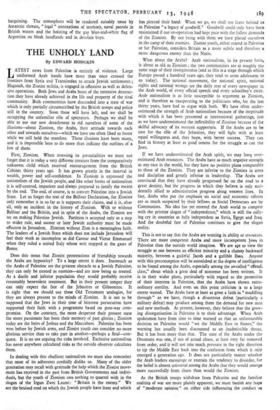ARGENTINE ARTIFICE
By GEORGE BRINSMEAD
pRESIDENT PERON is a military strategist by profession. Those who watched his rise to power during and immediately atter the war are well acquainted with his technique. He makes a provocative pronouncement, calculated to startle his opponents and to appeal to the patriotic sentiments and pride of a certain proportion at least of his countrymen. He grossly overstates his intentions and his demands. He then withdraws from the scene, leaving his adversaries to haggle with his subordinates. When negotiations reach a deadlock, threats are issued ; approaches are made in the direction of rival parties or nations ; demands, instead of being re- duced, are increased ; old grievances are fetched out from the nearly forgotten past.
In the background Juan D. Peron awaits the favourable hour. He has a deadline in view. He wishes to produce a personal triumph by a certain date : to add lustre to an anniversary, or to impress some group of his compatriots or some foreign State, or to gain the votes of electors. Simultaneously he is watching inter- national and internal affairs, and if necessary modifying his time- table as new tendencies develop. Then, suddenly, the moment crystallises. He strikes his blow or his bargain and, before the surprise has subsided, he makes his appearance on whatever balcony, platform or ballroom-floor is most convenient and spectacular. Handsome, smiling, carefree and gracious, he behaves as though all the threats and tension of the foregoing weeks had never existed. While he stands on the balcony or moves around the ballroom, waving to the multitude or flattering the diplomats and their ladies, his lieutenants are preparing or are already initiating the next offen- sive or series of offensives.
That is the Peron method. It was thus that, an ambitious and forceful colonel, he overcame his military and political opponents in 1945, and the opposition of the Radicals and U.S. Ambassador Braden in 1946. The same technique has been employed in dealing with British negotiators in the past two years, though in this instance the aim has been only to secure the maximum advantage before agreeing to co-operate. During the recent discussions President Peron had three main objectives: (t) to obtain the greatest possible quantity of plant, machinery, fuel and other materials necessary for his Five-Year Plan ; (2) to safeguard his holdings of sterling by means of gold or guaranteed shipments of gbods ; and (3) to sell his meat for maximum prices. His desire to complete the purchase of the railways was of minor importance, as the British were known to be even more eager on this score.
The President's deadline was February 24th, which is the second anniversary of his electoral victory and the brightest of red-letter- days in the calendar of Peronistas. He had in mind, too, the de- sirability of putting up a good show before the elections to the Argentine Chamber of Deputies next month. Meanwhile he must have been watching international events, such as the devaluation of the French franc with its possible repercussions on sterling. Last week's drop in commodity prices in Wall Street will have caused some anxiety, especially in view of the fact that, on the smaller acreages sown by Argentine agriculturists in 1947, bumper crops were being harvested. Just when the discussions with Sir Clive Etaillieu reached the most complete of deadlocks, the new Royal Mail liner ' Andes ' glided into Buenos Aires harbour. President Peron acted suddenly and decisively, and, before the reporters could believe their eyes and ears, there he was aboard the ' Andes ' with his wife: gay dresses, laughter and congratulations, and the band playing. The British officials deserve recognition not only for ther patience and perseverance during the long weeks of negotiation, but also for having prepared well in advance this culminating act of show- manship, so attractive to the Porte& temperament.
Of course the President did not obtain all the concessions that he had demanded, but it is his custom to guard against local criticism in such matters by letting forth a covering barrage of new claims and accusations. While the celebrations aboard the ' Andes ' were still in progress, other demands against Great Britain were gathering weight. The timeworn argument that the Falkland Islands belong to Argentina had been revived. Protests were being made that the British posts in Antarctica were in reality situated on Argentine territory. There are many further subjects for discussion—such as the British tramways in Argentina and the British-owned land and meat companies—but it seems that the Falklands are to be the immediate problem.
Argentina has never recognised the British presence in the Falk- lands, and has annually protested against the occupation. In British maps the islands, being a colony, are coloured red. In Argentine maps, as every local schoolchild knows, they are named Malvinas and are given the same colour as the mainland. For over a hundred years the islanders, who are of British descent, have lived a strange and desolate life. In "1946 President Peron, recognising that this was an issue on which his compatriots were united, began to take the matter in hand. He enlarged it oy claiming not only the Falk- land Islands, but the vast Antarctic area in which are situated the Falkland Dependencies, where British " scientific " bases have long been maintained. In January, 1947, an Argentine mission was appointed "to reaffirm Argentina's sovereignty" over this huge expanse of mostly icebound land and water.
The British Ambassador at Buenos Aires thereupon sent a note to the Argentine Foreign Minister offering the Argentine expedition "British hospitality and help on its arrival in the zone of the British Antarctic possessions." He also delivered a second note rejecting the Argentine territorial claims. The Foreign Minister declined the offer of hospitality on the ground that the region referred to was in fact Argentine territory, and he took special exception to the Ambassador's reference to the expedition as "Argentine visitors." The Argentines then issued a postage stamp showing the Falklands and the Dependencies as being situated within their qr. The bickering continued throughout 1947. Missions were organised by several nations. British posts were reinforced. Notes were again exchanged.
In January, 1948, Argentina established "a new and permanent wireless station" on Deception Island. H.M.S. ' Snipe ' retaliated by conducting the Governor of the Falkland Islands on a tour of the Dependencies. On February 6th (the day before the party aboard the ' Andes ') the Argentine Ministry of Marine announced that his navy, for the first time in history, was about to undertake full-scale manoeuvres in the Antarctic. During last week-end, while the "Andes Pact" was being drafted, recent letters exchanged be- tween London and Buenos Aires were published in the latter city. In this correspondence all the old claims were reiterated and in- tensified; the British suggestion that the dispute should be sub- mitted to the International Court at The Hague was rejected ; and Argentina repeated an earlier counter-proposal, that the interested countries should meet in conference at Buenos Aires.
With tactical skill President Peron has chosen to launch the Falkland-Antarctic offensive just at the moment when he might have been expected to relax. The " repatriation " of the Malvinas, like that of the railways, is a subject on which he will have the support of every Argentine citizen. "The rape of the Malvinas" is the traditional term by which the British occupation is designated. Argentina will never in an' circumstances recognise that occupation. If the President, counting on food shortage and inadequate industrial production in Great Britain next year, imagines that H.M. Govern- ment will consent to barter the Falklands and Dependencies for meat, he has greatly miscalculated. It is unlikely, however, that be has erred in this respect. The British possessions would, of course, be worth many a shipload of coal to him ; but I have no doubt that his plan really is to foster patriotic sentiment at home and to generate Argentine public indignation in preparation for forthcoming Anglo- Argentine discussions on finance, utility companies and trade. The Argentines are not to be allowed to relapse into the former easy- going relations with Great Britain. Every move is to be 'contested. No deal will be completed without bitter argument and herd bargaining. The atmosphere will be rendered suitably tense by Antarctic threats, " legal " annexations of territory, naval patrols in British waters and the hoisting of the gay blue-and-white flag of Argentina on bleak headlands and in desolate bays.



































 Previous page
Previous page